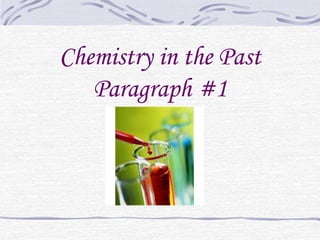
Chemistry in the past
- 1. Chemistry in the Past Paragraph #1
- 2. Chemistry is an old science. People were always interested in chemicals.
- 3. Source of picture: http://www.levity.com/alchemy/derstrae.html People who worked on chemicals before the 1700’s were called alchemists. Their kind of chemistry was called alchemy.
- 4. They had some strange ideas. For example, they believed they could make gold by mixing together the right things. For hundreds of years, alchemists tried to do this. Of course, no one ever made gold this way.
- 5. What is the main idea in this paragraph? a. Alchemists never made gold. b. Alchemists lived before the 1700’s. c. Alchemists studied chemicals in strange ways.
- 6. What is the main idea in this paragraph? a. Alchemists never made gold. b. Alchemists lived before the 1700’s. c. Alchemists studied chemicals in strange ways.
- 7. Chemistry in the Past Paragraph #2
- 8. Source of picture: http://www.th.physik.uni-frankfurt.de/ ~jr/gif/phys/boyle.jpg Robert Boyle (1627-1691) is sometimes called the “father of chemistry.”He started out as an alchemist, but he began to think in a different way.
- 9. For example, alchemists thought that everything was made out of four things—earth, air, fire and water,
- 10. but Boyle found that things are made up of many different elements.
- 11. In fact, he wrote a definition of what an element is. He said that an element is something that cannot be broken down into smaller parts. Boyle’s work marked the end of alchemy as a science.
- 12. Boyle’s chemistry equipment Source of image: http://www.stanford.edu/class/history34q/readings /ShapinSchaffer/AirPump.jpeg
- 13. What is the main idea in this paragraph? a. Robert Boyle helped build the science of alchemy. b. Robert Boyle said everything is made of four elements. c. Robert Boyle helped to start the science of chemistry.
- 14. What is the main idea in this paragraph? a. Robert Boyle helped build the science of alchemy. b. Robert Boyle said everything is made of four elements. c. Robert Boyle helped to start the science of chemistry.
- 15. Chemistry in the Past Paragraph #3
- 16. Antoine Lavoisier (1743-1794) is important in the history of modern chemistry. In about 1776, he began to use a new way to study chemicals.
- 17. Before Lavoisier, scientists just looked at something and thought about it. However, Lavoisier did experiments. He studied the size and weight of many different things. He found out something important.
- 18. He found out that nothing really goes away. It just changes into something else.
- 19. For example, when water boils, it doesn’t go away. It becomes steam, a cloud of water. This was an important idea for the future of chemistry.
- 20. What is the main idea in this paragraph? a. Antoine Lavoisier used experiments to study chemicals. b. Antoine Lavoisier studied the size and weight of water. c. Antoine Lavoisier lived in the 1700’s
- 21. What is the main idea in this paragraph? a. Antoine Lavoisier used experiments to study chemicals. b. Antoine Lavoisier studied the size and weight of water. c. Antoine Lavoisier lived in the 1700’s
